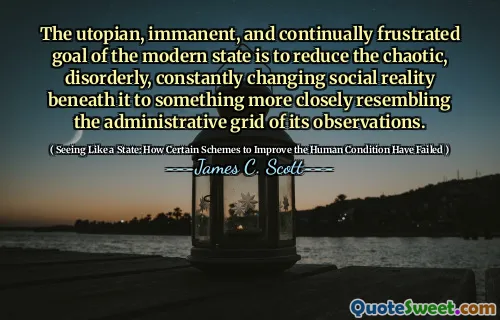
The utopian, immanent, and continually frustrated goal of the modern state is to reduce the chaotic, disorderly, constantly changing social reality beneath it to something more closely resembling the administrative grid of its observations.
James C. Scott's quote succinctly captures the tension between the state's desire for control and the inherent complexity of social life. The notion of a "utopian, immanent, and continually frustrated goal" highlights how the modern state aspires to impose order and predictability on the world it governs. This ambition is both grand and idealistic, yet it is also perpetually met with obstacles because social realities are intrinsically dynamic, fluid, and resistant to complete systematization.
The use of words like "chaotic," "disorderly," and "constantly changing" paints social life as unpredictable, something that defies neat categorization or management. Conversely, the "administrative grid" metaphor reflects the state's bureaucratic desire to simplify and quantify social phenomena, transforming them into manageable units for governance and planning. This grid is emblematic of policies, laws, and regulations engineered to observe, classify, and control society.
What resonates most deeply is the ongoing frustration inherent in this process; the state's drive toward legibility clashes with the lived realities of individuals and communities, whose behaviors and interactions do not always align with the state's frameworks. This persistent misalignment can lead to unintended consequences, inefficiencies, or even alienation.
Overall, Scott reveals a critical insight into the limitations of state power: while the desire to create order stems from rational and sometimes noble motives, the complexity of social life may forever elude full capture by administrative frameworks. It invites reflection on the humility and caution required when designing interventions in human societies.






